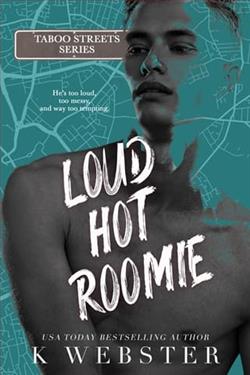Page 47 of Broken SEAL'S Secret Baby
“Great! We can stop in and see Aunt Ninny and Uncle Toohot.”
“Who?” I ask, wondering if I’d heard correctly.
“Oh, those aren’t their real names,” she explains. “They are Alice and Richard Smith, Mom’s sister and brother-in-law. At some point, she said that he was just too hot to handle, and someone else told her she was a ninny to think so — and they’ve been Aunt Ninny and Uncle Toohot to us kids ever since.”
“I suppose they encouraged it?” I ask.
“Oh, of course! At every possible chance. They run the post office in Spindizzy — or they did until someone bought everything out.”
I sighed. “I bought it,” I say. “It was becoming a ghost town. As far as I know, the post office is still operating, and a Mr. and Mrs. Smith are in charge of it.”
Kate stares at me in the rearview mirror. She is on the bench seat, tucking a blanket around Cece. “You bought it?”
“Yeah,” I say. “Me and the corporation. It’s a good location, it already has water wells, municipal utilities, and a post office. It just needs some kind of industry and a few more citizens. Best of all, it’s got a paved parking lot where we canget these people set up before all the cars and vans sink out of sight in the mud.”
She just continues to stare.
“Dammit, Kate, did I leave another country gate open?”
“Don’t swear in front of your daughter,” she reprimands. “And, yeah, you kind of did.” There is an angry edge to her voice that I don’t like. More than that, I realize that it hurts to have her upset with me.
Several things run through my mind to say, most of them involving words that Cece shouldn’t learn and repeat. Finally, I say, “How?”
Kate turns to Cece, handing her a sippy cup of juice and securing a lunch package where my daughter can reach it. “You ok?” she asks.
“Yes!” Cece declares. “I’m a big girl, I can feed myself!”
“All right,” Kate says. “I’m going upfront to talk to your daddy.”
Kate climbs between the seats, pops Gidget in the back, and settles herself in the passenger seat. “What had you planned to do with the place?”
“I really hadn’t decided,” I say. “I’d just acquired it when Em got sick. I had some ideas, but she was a high priority for me, and then there was settling you in with Cece. I just hadn’t gotten back around to even thinking about it. Modernize the housing, put in something that earns money, that kind of thing.”
She rolls her eyes at me. “Those are just crumbling old houses to you, but to a lot of people who live not too far away, those are the places where their grandparents lived, or their favorite aunt or uncle. Even though most people don’t have jobs close enough to move back in, those are ancestral homes — just as much as if they were castles in Scotland.”
We pass flooded fields and rows of windmills. The silence in the truck stretches to uncomfortable proportions.
“Why is it named Spindizzy?” I ask, hoping to get her talking again.
“See those windmills?” she says, nodding toward the rows and rows of towers, some so vintage in style Don Quixote would have recognized them; some are quite modern.
“Yeah?” I raised an eyebrow at her.
“That’s how the town gets its name. You wouldn’t think it today, but Kansas can get super dry in the summer. The older windmills are pumping water, and the newer ones are producing power. It isn’t enough . . .” She stops talking and looks out the window.
I can fill in the blanks. The families who had owned the properties — often with years of back taxes on them, bank liens, and more, had hoped they could earn enough working in some city or other to return. And I’d destroyed that hope.
I groan. “I really have stepped in it, haven’t I?”
“Yeah,” Kate says. “But you didn’t know.”
I feel relief wash over me, for I heard forgiveness in her tones. Somehow, that is important. Far more important to me than any other opinion has ever been before.
“What shall we make of it, my Dainty Kate?” I ask.
She catches the reference. “Do you think me a shrew in need of taming?”
“No,” I shake my head, “Only when I’ve done something outrageously citified and stupid. Seriously, how can I fix this?”















